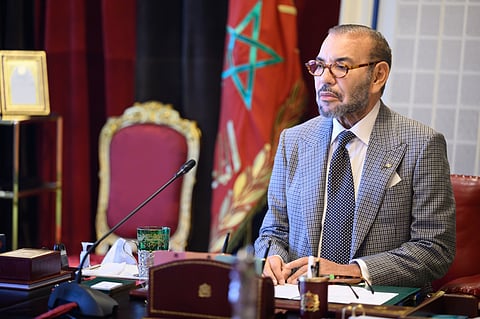King Mohammed VI Chairs Meeting Of Moroccan Council Of Ministers
Rabat, October 21 (TNA) King Mohammed VI chaired, on Friday at the Royal Palace in Rabat, a Council of Ministers, focused on examining the general orientations of the draft Finance Bill for 2025, and approving draft decrees relating to the military field, as well as several international agreements and appointments to senior positions, according to statement from the Royal Palace’s Spokesperson.
The Minister of Economy and Finance presented before His Majesty the King, the broad lines of the draft Finance Bill for 2025. Further reinforcing the pillars of the social state, particularly through the harmonious and effective implementation of the social protection generalization project. After the generalization of compulsory basic health insurance, the implementation of the direct social aid, which has benefited about four million families, will be completed, in parallel with the ongoing health system reform.
The roadmap for education system reform and social dialogue support will also be further implemented, in addition to the various projects that fall within the framework of the general reconstruction and rehabilitation program for areas affected by the Al Haouz earthquake and the floods in the Southeast of the Kingdom.
Secondly Consolidating the investment and job-creation momentum in line with the High Royal Instructions, by stimulating private investment and implementing the Investment Charter, with a focus on accelerating the process of approving investment projects, and continuously improving the business climate.
Public investment will also be stimulated and ongoing structural projects will be further implemented, notably the "Green Generation” strategy, the projects related to the green hydrogen sector, transition to clean energy and the roadmap for the tourism sector, while ensuring that water resources management is a top priority, accelerating the implementation of the National Drinking Water Supply and Irrigation Program, and giving special importance to the large-scale projects related to preparations to host the 2030 World Cup.
In parallel, a concrete roadmap for employment promotion will be implemented, according to an integrated and multidimensional approach, aiming to stimulate investment momentum, notably in the sectors with the greatest impact in terms of job creation. It is also meant to strengthen support for micro, small and medium-sized enterprises, to increase the impact of active employment programs and to mitigate the repercussions of drought on employment in rural areas.
Further implementing structural reforms, notably the judiciary reform by completing its legislative and regulatory frameworks, generalizing family courts and modernizing the judicial administration and its digital transformation.
This is a substantial move, involving countries that are friends and important partners for Morocco.
Further implementing advanced regionalization and public institutions and enterprises’ reform, particularly by implementing the strategic orientations of the state's contribution policy.
Fourthly maintaining the sustainability of public finances, by taking the necessary measures to ensure the gradual restoration of financial balances and the necessary funding for scheduled projects, while reducing the budget deficit and restoring the necessary financial margins to address potential future risks and crises.
Following approval by the Council of Ministers of the general guidelines of the draft Finance Bill for 2025, seven draft decrees relating to the military field were adopted. The Council of Ministers adopted nineteen international agreements, including sixteen bilateral and three multilateral agreements.
The bilateral agreements aim to mutually promote and protect investments, strengthen cooperation in the fields of justice, fisheries, tourism, mutual administrative assistance in customs matters, international road transport and air services.
The multilateral agreements concern the establishment of a permanent headquarters for the Pan-African Institute for Development in Dakhla, the facilities and benefits of the North Africa Regional Office and the National Office of the Francophone University Agency in Morocco, and the agreement relating to the UN Convention on the Law of the Sea concerning the conservation and sustainable use of marine biological diversity in areas beyond national jurisdiction.
In accordance with the provisions of Article 49 of the Constitution, and at the proposal of the Head of Government and on the initiative of the Minister of the Interior, HM the King has kindly appointed a number of Walis and Governors to the Central and Territorial Administration.
On the proposal of the Head of Government, and on the initiative of the Minister of Foreign Affairs, African Cooperation and Moroccan Expatriates, HM the King has appointed several ambassadors to several brotherly and friendly countries.
This movement of ambassadors takes place in a national context marked by the latest Royal Address to Parliament on October 11, in which the Sovereign gave new impetus to diplomatic action, placing particular emphasis on the mobilization of diplomacy in all its components - institutional, partisan and parliamentary.
The movement of ambassadors decided by His Majesty the King today also takes place in a highly complex regional and international context, which certainly presents Morocco withmajor challenges, but which also conceals important opportunities that the diplomatic apparatus must be able to seize.

